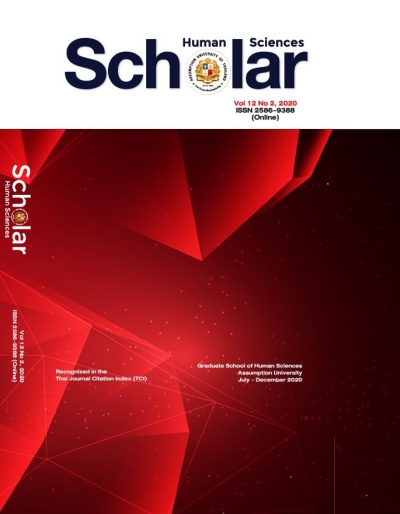A Comparative Study of Attitudes Toward Learning Chinese as a Foreign Language of Grades 3-4 Students at an International School in Samut Prakarn, Thailand
Keywords:
Attitude Toward Learning Chinese as a Foreign Language, Grades and Language attitudes, Primary Year Program, Samut Prakarn, ThailandAbstract
This study was conducted to investigate 63 Grade 3 and 66 Grade 4 students’ attitudes toward learning Chinese as a foreign language (in terms of affective, behavioral and cognitive components) at an international school in academic year 2018-2019 in Samut Prakarn, Thailand. It was designed as a quantitative and comparative study. An adopted version of The Attitude toward Learning Chinese as a Foreign Language Questionnaire by Abidin, Pour-Mohammadi and Alzwari (2012) was used for data collection. The questionnaire included three subscales (attitude in terms of affective component, attitude in terms of behavioral component and attitude in terms of cognitive component) to discover the students’ attitudes toward learning Chinese as a foreign language. The data collected from the 129 questionnaires were analyzed by means and standard deviations, a multivariate analysis of variance (MANOVA) and independent samples t-tests. These were used to determine whether there was a significant difference between Grades 3 and 4 students’ attitudes toward learning Chinese as a foreign language (in terms of affective component, behavioral component and cognitive component). The study suggested that there was a significant difference between Grades 3 and 4 students’ attitudes toward learning Chinese as a foreign language.
References
Abidin, M. J. Z., Pour-Mohammadi, M., & Alzwari, H. (2012). EFL students’ attitudes toward learning English language: The case of Libyan secondary school students. Asian Social Science, 8(2), 119-134.
Ajzen, I. (1991). The theory of planned behavior. Organizational Behavior and Human Decision Processes, 50(2), 179-211.
Al-Zahrani, M. (2008). Saudi secondary school male students’ attitudes toward English: An exploratory study. J. King Saudi University, Language and translation, 20, 25-39.
Breckler, S. J. (1984). Empirical validation of affect, behavior, and cognition as distinct components of attitude. Journal of Personality and Social Psychology, 47(6), 1191-1205.
Eagly, A., & Chaiken, S. (1998). Attitude structure and function: Handbook of social psychology. Boston, MA: McGrow Company.
Gardner, R. C. (1985). Social psychology and second language learning. The role of attitudes and motivation. London, LDN: Hodder Arnold.
Gardner, R. C. & Lambert, W. E. (1972). Attitudes and motivation in second language learning. Rowley, MA: Newbury House.
Hsu, Z. (1986). Attitude, motivation and achievement in EFL. Journal of Research in Education Sciences, 198603, 471-493.
Kara, A. (2009). The effect of a ‘learning theories’ unit on students’ attitudes toward learning. Australian Journal of Teacher Education, 34(3), 100-113.
Krashen, S. D. (1981). Second language acquisition and second language learning. Oxford: Pergamon Press Inc.
Lambert, W. E. (1967). A social psychology of bilingualism. Journal of Social Issues. 23(2), 91-109.
Li, B. L., & Cao, W. F. (2015). A study of learning attitude toward Chinese learning as a foreign language in University Sains Malaysia. The Science Education Article, 336, 32-34.
Luo, H., & Limpapath, P. (2016). Attitudes toward learning Chinese as a foreign language: A case of Thai senior high school students at a private school in Bangkok. BU Academic Review, 15(2), 102-112.
Masuntisuk, R. (2013). Chinese language teaching in Thailand at the primary and secondary education levels. Retrieved from http://www.thaiworld.org/upload/question/file_827.pdf
Muller, T. H., & Miller, R. I. (1970). A study of student attitudes and motivation in a collegiate French course using programmed language instruction. International Review of Applied Linguistics, 8(4), 297-320.
Van den Berg, H., S.R. Manstead, A., van der Pligt, J. & H.J. Wigboldus, D. (2006). The impact of affective and cognitive focus on attitude formation. Journal of Experimental Social Psychology, 42(3), 372-379.
Wenden, A. (1991). Learner Strategies for Learner Autonomy. London: Prentice Hall.




